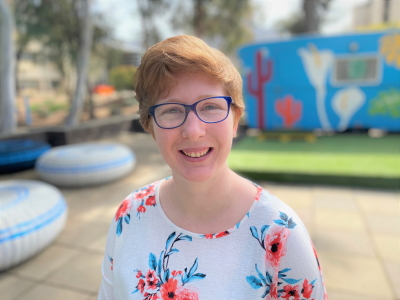
UC nursing student, Jess Turner was the first recipient of the Caring for Older People Award (COPE) awarded in 2019.
The COPE Award is an annual award of $1000 for a nursing student who demonstrates a deep passion for improving nursing outcomes in the aged care sector, to honour the life of Dr Sarah Cope and her deep passion for the elderly.
Dr Cope, a much-loved teacher and academic at the University of Canberra, passed away in her prime in 2019. While the loss of Dr Cope left a large hole in the heart of UC’s Faculty of Health, she has left a lasting legacy that will shape UC’s nursing students in the future.
Dr Cope’s husband and UC’s Faculty of Health established the COPE Award to support equally passionate nurses and aged care workers in this field and to continue her legacy.
Jess Turner says she is honoured to have been the first recipient of the Award and her entire demeanour lights up when she talks about Dr Cope and her work in the aged care sector. Clearly, they shared a passion for helping the vulnerable and making a meaningful difference.
While Dr Cope’s research focussed on dementia, Jess’ research is focussed on the impact of nutrition on the disease.
“My research shows that if you eat well, it slows the progression of dementia. If you look at the quality of food in aged care facilities, its going down. I think patients with poor nutrition get sick faster and if they have dementia, it speeds up the onset. I want to change nutrition in aged care facilities to improve patients’ lives.”
Jess had planned to use the money from the Award to network at professional conferences as she chases support and partnerships to help her conduct her research. She hasn’t been able to fulfil all her plans yet due to the COVID-19 pandemic and subsequent cancellation of large events.
However, she has found other ways to continue her work and has spent time in lockdown learning Auslan (Australian sign language) which she believes could assist her in treating dementia patients with hearing loss.
Jess has also developed a pilot program with an aged care facility in Canberra for a group of 10 to 15 dementia patients for a regular“ swim, coffee and cake. It’s important that they have the opportunity to enjoy an outing, and see the world.”
The swimming pilot will commence in January 2021 and Royal Life Saving is on board as a supporter and other partnerships are already in Jess’ sights.
“The idea came from my Nanna. She doesn’t have dementia, but she has memory loss and lives in an aged care facility. One day she said to me ‘I am an ex-swim teacher and I miss being able to get into the family pool, because I’m unable to,” says Jess.
Jess’ Nanna has limited mobility, which means there is no way for her to safely get in or out of the pool.
Unsurprisingly, dementia is often accompanied by depression, which makes dementia symptoms worse. Jess is passionate when she describes that a powerful way to push back depression is to continue to have access to the outside world, and enjoyable physical and social activities.
“The worst thing you can do is put someone into a facility and forget about them.”
In addition, part of treating dementia patients is about helping them make connections with memories that are slipping away. Give a dementia patient a doll, they will often hold it like a baby. They might intuitively make the connection.
“I was a parent. I have a son. I have a daughter. I have grandchildren.”
Jess’ pilot swim program will not only be beneficial for social interaction, it will also provide an important cognitive reminder of the life the patients led and who they are. “Lightbulbs go off and they will connect forgotten pathways such as ‘hang on, I used to be a swim teacher. I used to live near the beach,” says Jess.
“It’s a social and cognitive link to make people happier and more fulfilled in life and to know who they are.
Jess has worked with dementia patients as young as 45. She believes research in the sector is critical for improving lives.
“I’m glad more and more people are speaking up about dementia and aged care.”
She thinks it is easy for society to prioritise neo-natal and other health areas, because there’s a misperception of the aged along the lines of: “Okay, you’ve lived your life” “Your turn is over.”
“As a parent myself, I don’t understand why one life is more important than the other. Why can’t the other side of the spectrum be equally important? We are all going to get there,” Jess says.
Determined to help, Jess is brimming with ideas and training solutions that she hopes she can pursue in the future. It’s a long road ahead, but clearly the COPE Award committee got the inaugural recipient right.
Jess has some words of advice for potential applicants for the COPE Award in 2020: “go for it! If you are passionate about the aged care sector, this award is for you.
“Sarah was so passionate about her work and it was a privilege to know her.Don’t just go for the Award because you want another. Make it meaningful to you and to Sarah’s legacy.”

